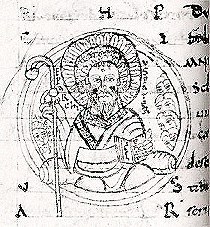Adémar de Chabannes (Adémar de Chabannes)

Chronicler, Composer, Literary Forger. A controversial French monk of the Middle Ages. His “Apostolic Mass for St. Martial” (1029) is Europe’s earliest surviving music score written in the composer’s own hand – and an extraordinary fraud. Adémar was born in Limoges, Limousin, into a family with prominent ties to the Catholic Church. Before 1000 he was pledged as a child oblate to the Benedictine Abbey of St. Cybard in Angoulême, and from 1010 received higher education at the Abbey of St. Martial in Limoges. He spent most of his life at St. Cybard’s as a scribe, though his extensive knowledge of plainchant suggests he was also a singer; a fragment of an early composition, an “Office for St. Cybard”, survives. Adémar was ambitious and devoted his free time to writing sermons and homilies, some adapted from the fables of Phaedrus. His biggest literary work is the three-part history “Chronicon Aquitanicum et Francicum” (“Chronicle of Aquitaine and France”, 1028). When he failed to win nomination as Abbot of St. Cybard’s in 1028, he transferred to the more prestigious Abbey of St. Martial. At this time a local cult arose around the idea that the patron saint of that institution, the 3rd Century missionary bishop Martial, had lived much earlier and was the 13th Apostle of Jesus. Whether Adémar started this cult or took to promoting it with a vengeance is open to question; but either way he had the support of the Bishop of Limoges and others who stood to profit from the wealth and fame this would bring to the abbey as a major pilgrimage site. He launched his campaign by forging a backdated copy of Bishop Aurelian’s 3rd Century book “The Life of St. Martial” (1029), the original for which had been lost in a fire and was unavailable for comparison. Adémar’s additions stated that Martial was a cousin of St. Peter, was present at the Last Supper and the Crucifixion, and was sent by Peter to preach to the Gauls. He furthered these fantastic claims in the new liturgy he composed for Martial, consisting of Office and Mass, as well as Offices for Martial’s companions Saint Valeria and Saint Austriclinianus. The premiere of the “Apostolic Mass for St. Martial” at the Cathedral of Limoges on Sunday, August 3, 1029 was a milestone in music history: the first documented fiasco. A visiting Italian monk named Benedict of Chiusa disrupted the performance as soon as it began with loud accusations that Adémar’s Mass and the cult itself were heretical shams. He demanded that proof of Martial’s apostolic status be produced for all to see, and when Adémar hedged the congregation turned against him. The event was called off to prevent a riot. At a private gathering that evening Benedict examined the Martial texts and exposed Adémar’s forgeries; news of the scandal would eventually make St. Martial’s Abbey a laughing stock throughout Europe. The discredited Adémar was sent packing to St. Cybard’s the next day, to be shunned by fellow monks and ordered to do needless copywork as penance. Unable to cope with his downfall, he went on a pilgrimage to Jerusalem in late 1033 or early 1034, and died there. In the long run his fraudulent efforts were not entirely unsuccessful. Before leaving for the Holy Land he deposited his papers at St. Martial’s Abbey for safekeeping. Among them were documents he obsessively continued to fabricate after 1029 (including a forged letter attributed to Pope John XIX) in the apparent hope that future generations would use them to revive the “Martial the Apostle” cult. St. Martial monks of the 1200s did just that, whitewashing Adémar’s reputation in the process, and for centuries afterwards Martial was venerated in Limoges. In 1854, the city’s Bishop Buissas petitioned Pope Pius IX to reconsider Martial as a disciple of Christ; the request was denied and the matter put to rest once and for all. For the better part of a millennium Adémar was known chiefly to medievalists for his “Chronicon Aquitanicum” and his forgeries. Interest in his activities as a composer did not surface until the 1990s through the work of scholars James Grier and Richard Landes. This is surprising given the wealth of material on hand – 257 pages of music manuscript by Adémar are extant, the largest body of autograph scores from a single composer before Guillaume de Machaut in the 14th Century. In 1999, 970 years after its aborted premiere, the “Apostolic Mass for St. Martial” was given its first complete performance in a recording by the New York Ensemble for Early Music. It shows Adémar to have been a talented musician, adept at the different melodic styles of plainchant, which he used outside of their respective genres for original and even dramatic effect. It’s one of history’s little ironies that while most medieval music has been lost or exists only in fragments, this beautiful scam has survived in all its mendacious glory. (bio by: Bobb Edwards)
Born
- January, 01, 1970
Died
- January, 01, 1970
Cemetery
- Monastery of St. Mary of the Latins (Defunct)
- Israel

